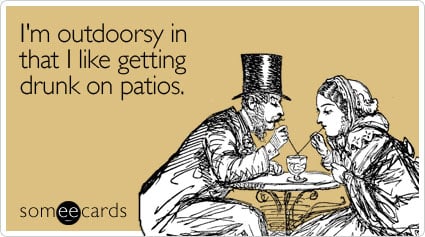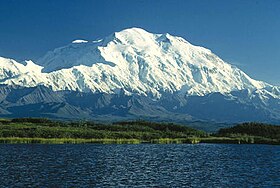 |
I don't always wear a bonnet.
But when I do, I'm usually drinking. |
Warning: There is a distinct possibility my views on nature biased my opinion of this book. Natures is lovely. I appreciate its grand and gloriously complex ecosystems that create simple beauty. I understand its value and its fragility in an increasingly industrialized society. But usually I like to do all that with four walls and some glass separating me from nature. There are bugs in nature. And heat. These are things that make me cranky. It's best for everyone if I mainly stay indoors. (If I ever tell you I've been camping, I should be checked for ticks and psychotic breaks.) So it should come as no surprise that I thought the guy in this non-fiction account was crazy before I ever read a word inside the book jacket. So, yeah, maybe I shouldn't be the one reviewing this book.
Into the Wild became a book after Mr. Krakauer investigated the circumstances of Christopher Johnson McCandless's death for
Outside magazine. (I assume by now it's obvious that I'm not a subscriber to said magazine, and therefore wasn't aware of this incident until I saw this book...at an indoor book store....where there's no nature except in pictures. As it should be.) The book is the culmination of Mr. Krakauer's investigation and research into the odd matter. It's not odd that someone would die in the remote wilderness of Alaska, but it is odd that before his sojourn into Seward's Folly, McCandless basically disavowed established society after an upbringing that embraced it. The book traces McCandless's nomadic steps after his graduation from Emory University in 1990 to his death alone in the Alaskan wilderness north of Mt. McKinley in 1992.
Krakauer interviewed those known to have come in contact with McCandless, though he went by the name Alexander Supertramp at the time. There are many things that no one will ever be able to piece together. What Krakauer was able to discern comes from Alex's journals and interviews. Apparently Alex came to believe writers such as Tolstoy, Thoreau, and Jack London understood how one should live: without an attachment to materialistic things and an ability to live off the land. Alex started off on his journey in his own vehicle, but after it was flooded around Lake Mead he abandoned it and continued by means of hitch hiking and train jumping. As he left his car, he also burned all of his identification and cash so he left with a backpack of meager supplies and his journal. From there he traveled through South Dakota, Nevada, even as far south as Mexico before he made his way back to South Dakota. There he worked for a friend he had made during his first trip through the state, as a way to earn money for supplies for his ultimate destination: Alaska.
 |
| Mt. McKinley |
The book is well-written, though I'll admit that I prefer a more chronological re-telling than the one presented in
Into the Wild. But it was very interesting and, actually, quite sad. I want to know more about his family situation before his great disappearance. It seems odd to me that his family had no idea he planned to do this. I want to know more about his obsession with the particular writers he often quoted to others, as well as continually re-reading. I want to know why he felt Alaska, and not say some remote part of Canada, was the ultimate test of one's ability to survive and understand The Wild. (Though I supposes Jack London has quite a bit to do with that.) And I want to know why, with his obvious intelligence and respect for nature and its potential brutality, he didn't walk into the wilderness better prepared. He had little food, meager supplies, and almost no means of acquiring more food. Which, coupled with an injury, is why he starved to death. At the end of the book I had more questions than answers, but not necessarily in an unsatisfactory way. There is no way for Krakauer, or anyone really, to be able to answer the questions because the answers all went with Christopher McCandless/Alex Supertramp; into the wild.




I believe in running water and beds that rest several inches above the ground. Plus I DETASSLED. Basically, as you know, I'm with you on this "nature is great when viewed from afar" thing.
ReplyDeleteI haven't read it, but Emile Hirsch did an excellent job in the movie. I was left with very similar questions. I'm actually very indoorsy if you didn't know :)
ReplyDelete~Kelly